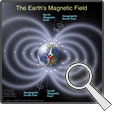What
are electric and magnetic fields?
A
field is an influence or force that exists
throughout space, that one body exerts
on another. Gravity is one such field.
All matter responds to gravity, but if
matter is electrically charged or contains
currents, it also responds to electric
and magnetic forces.
Electric
charges and changing magnetic fields produce
electric fields. Here on Earth, we have
learned how to produce electricity by using
motors, called generators, which cause magnetic
fields to change. These changing magnetic
fields create the electric current we use
in our homes.
 Electric
charges in motion (an electric current)
and changing electric fields produce
magnetic fields. For instance, flows
of molten metals deep inside Earth's
core cause currents which sustain
a huge magnetic field that extends
far
into space. Electric
charges in motion (an electric current)
and changing electric fields produce
magnetic fields. For instance, flows
of molten metals deep inside Earth's
core cause currents which sustain
a huge magnetic field that extends
far
into space.
As
seen in the diagram above, magnetic
fields are represented
by lines of force. When the lines
are close together, the force of
the field
is great; when they
are far apart, the force is weak. Earth's magnetic field lines spread out
from the south polar region and come
together in the north polar region.
The field
is strong at the poles and weak at Earth’s equator. Charged particles are guided by Earth's magnetic field (see Protective Shield for information about this fascinating interaction). |
Understanding
how plasmas interact with electric and
magnetic fields gives us a better idea
of what is happening between the Sun and
Earth and elsewhere in the universe, but
many mysteries remain.
|

